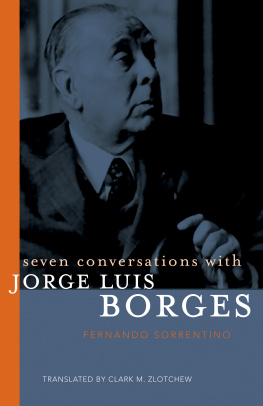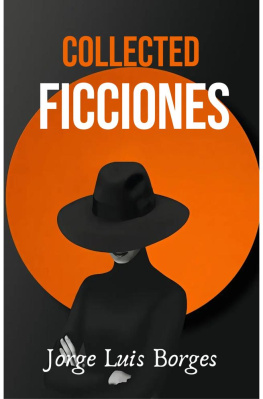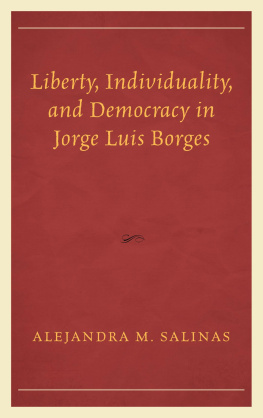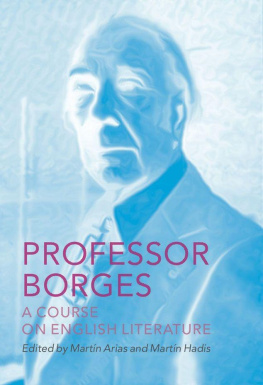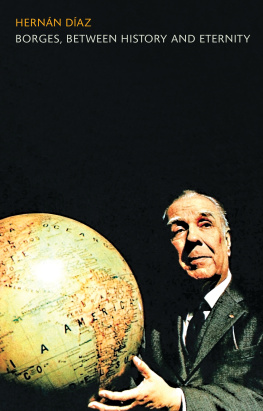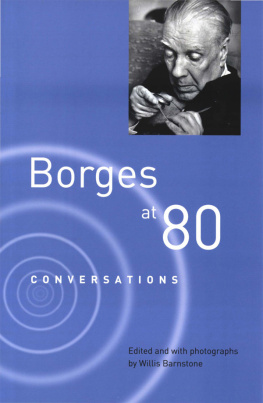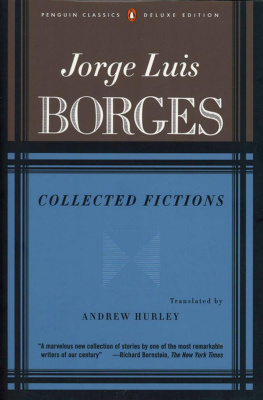Fernando Sorrentino - Seven Conversations with Jorge Luis Borges
Here you can read online Fernando Sorrentino - Seven Conversations with Jorge Luis Borges full text of the book (entire story) in english for free. Download pdf and epub, get meaning, cover and reviews about this ebook. year: 2012, publisher: Paul Dry Books, genre: Art. Description of the work, (preface) as well as reviews are available. Best literature library LitArk.com created for fans of good reading and offers a wide selection of genres:
Romance novel
Science fiction
Adventure
Detective
Science
History
Home and family
Prose
Art
Politics
Computer
Non-fiction
Religion
Business
Children
Humor
Choose a favorite category and find really read worthwhile books. Enjoy immersion in the world of imagination, feel the emotions of the characters or learn something new for yourself, make an fascinating discovery.
- Book:Seven Conversations with Jorge Luis Borges
- Author:
- Publisher:Paul Dry Books
- Genre:
- Year:2012
- Rating:3 / 5
- Favourites:Add to favourites
- Your mark:
- 60
- 1
- 2
- 3
- 4
- 5
Seven Conversations with Jorge Luis Borges: summary, description and annotation
We offer to read an annotation, description, summary or preface (depends on what the author of the book "Seven Conversations with Jorge Luis Borges" wrote himself). If you haven't found the necessary information about the book — write in the comments, we will try to find it.
Seven Conversations with Jorge Luis Borges — read online for free the complete book (whole text) full work
Below is the text of the book, divided by pages. System saving the place of the last page read, allows you to conveniently read the book "Seven Conversations with Jorge Luis Borges" online for free, without having to search again every time where you left off. Put a bookmark, and you can go to the page where you finished reading at any time.
Font size:
Interval:
Bookmark:
....................................................................
seven conversations
with
Jorge Luis Borges
FERNANDO SORRENTINO
Translated, with Notes and Appendix
by CLARK M. ZLOTCHEW
 | PAUL DRY BOOKS Philadelphia 2010 |
CONTENTS
First Paul Dry Books Edition, 2010
Paul Dry Books, Inc.
Philadelphia, Pennsylvania
www.pauldrybooks.com
Copyright 1982, by Fernando Sorrentino & Clark M. Zlotchew
1 3 5 7 9 8 6 4 2
Printed in the United States of America
Library of Congress Cataloging-in-Publication Data
Borges, Jorge Luis, 18991986.
[Siete conversaciones con Jorge Luis Borges. English]
Seven conversations with Jorge Luis Borges / Fernando Sorrentino ;
translated, with Notes and Appendix by Clark M. Zlotchew.
1st Paul Dry Books ed.
p. cm.
Includes indexes.
Originally published: Troy, N.Y. : Whitston Pub. Co., c1982.
ISBN 978-1-58988-060-3 (alk. paper)
1. Borges, Jorge Luis, 18991986Interviews. 2. Authors, Argentine 20th centuryInterviews. I. Sorrentino, Fernando. II. Zlotchew, Clark M. III. Title.
PQ7797.B635Z47713 2009
868dc22
2009033107
seven conversations with
Jorge Luis Borges
Do I contradict myself?
Very well then I contradict myself,
(I am large, I contain multitudes.)
Walt Whitman
Jorge Luis Borges is the most eminent Latin-American writer of the twentieth century. It is even safe to say that he is the best known and most admired living writer in the Spanish language. Translated into all the major tongues, his poetry, essays, and short fiction are among the most important pieces of modern world literature. Very few authors are as widely praised, criticized, loved, abhorred, discussed, or argued over. A respected critic and novelist has described him in these contradictory terms: arbitrary, brilliant, tender, precise, weak, great, triumphant, daring, timid, a failure, magnificent, wretched, limited, infantile, immortal. To say any more about Borges within the confines of these introductory pages would be to say too much and, at the same time, to say too little. Too much because his fame would make redundant any catalog of his accomplishments. Too little because the detailed critical and philosophical discussion his work gives rise to would be far beyond the scope of a foreword to a series of conversations in which Borges speaks for himself.
These dialogues with Borges have been called the best book of its kind, the one that provides the most reliable picture of Borges derived from tape-recorded conversations with him. The same critic finds in these interviews an exceptionally open and intimate tone.the overly frank tone of Borges political statements, could not be commercially distributed until after the overthrow of Isabel Pern in 1976.
Fernando Sorrentino is Borges interviewer in these pages. Born in 1942, this young Argentinean writer is an author of fiction in his own right as well as a devoted anthologist of Spanish-American short stories and an instructor of literature in the secondary schools of Buenos Aires. His literary production (consisting of over thirty short stories published in various newspapers, three books of short stories, a collection of juvenile stories, and a novel) is predominantly satirical in nature, ranging from the dryly ironicat times sardonicobservation of human foibles to the frankly hilarious exaggeration of normal situations to the point in which they take on alarming proportions which approach the surreal. Sorrentinos novel, Sanitarios centenarios (Buenos Aires: Plus Ultra, 1979), concerning the advertising campaign mounted on behalf of a bathroom fixture firm celebrating its hundredth anniversary, is a satire involving the delusions of grandeur of ordinary people; it is also an uproariously funny narrative.
A series of interviews even with the most talented author can result in a bleak succession of banalities that prove to be a disappointment for the avid fan; a great deal depends on the skill of the interviewer. Fernando Sorrentino is endowed with literary acumen, sensitivity, urbanity, a familiarity with Borges work, and the ability to allow Borges to roam freely over unsuspected paths while at the same time maintaining a firm control over the direction taken by the conversation. All these qualities are as responsible for this warm and personal glimpse of one of the most fascinating figures in contemporary world literature as Borges own personality is.
Borges wanders from nostalgic reminiscence to literary criticism and from philosophical speculation to political pronouncements. His thoughts on literature alone run the gamut from the Bible and Homer to Hemingway and Cortzar. We learn that Dante is the writer who has impressed Borges most, that Borges considers Garca Lorca to be a second-rate poet, and that he feels Bioy Casares is one of the most important authors of this century. Borges dwells lovingly on Buenos Aires, too.
As in his prose and more often in his poetry, in these pages Borges refers to the outskirts of the City and to the denizens of those humble quarters. In those frequent references, he speaks of a Buenos Aires which essentially no longer exists. The fact that the Buenos Aires of Borges youth bears much less resemblance to a North American city than does the Argentine Capital of today (the city Borges has not seenthrough blindnessfor a quarter of a century) makes it difficult to translate some of the terms he employs when commenting on the Buenos Aires of old.
The term suburbio literally denotes suburb, deriving from the same Latin sub and urbs as does the English word. But here the similarity ends. When the North American thinks of suburbs, he thinks of two-car garages, manicured lawns, country clubs, good schoolsin other words: affluence. The Latin-American suburbio is typically a marginal zone, both literally and figuratively: a zone on the edges of society. It is the poorer quarters huddled on the cheaper land at the outskirts of the big city where destitute country folk settle hoping to find a better life. An entire sub-culture develops in these suburbs characterized by poverty and the cult of violence and machismo. In this respect, the Latin-American suburb is practically synonymous with the North American slum or inner city; yet, like the Northern affluent suburb, it is situated around the fringes of the city. The situations are reversed, making a simple one-word translation unfeasible. In the text of this English version, the term suburb, because of the peculiar connotations it has for the North American, is avoided. Instead, expressions such as outlying slums, outer limits, less affluent fringe areas, and the like are employed.
The compadre might be thought of as an urbanized (or semi-urbanized) gaucho. Many of the traits of the gauchoself-assurance, courage, love of personal freedom and of being footloosewere typical of the compadre.
The compadrito (diminutive of compadre) was the young man of the suburbios whose only interests were women, dancing, guitar playing, and drinking the local rum called caa. He customarily lived at his womans expense. He differed from the compadre mainly in his youth and his avoidance of work. By extension, the term compadrito came to include the young men who liked to imitate the attitudes and flashy dress of the genuine article. Toward the 1880s many compadritos became out-and-out pimps. (The slang term for pimps as such was canfinfleros or cafishos.) They would exploit only one woman (unlike the pimp of the North American inner city who maintains an entire stable) or two, at most, who would work in a house of prostitution for the
Next pageFont size:
Interval:
Bookmark:
Similar books «Seven Conversations with Jorge Luis Borges»
Look at similar books to Seven Conversations with Jorge Luis Borges. We have selected literature similar in name and meaning in the hope of providing readers with more options to find new, interesting, not yet read works.
Discussion, reviews of the book Seven Conversations with Jorge Luis Borges and just readers' own opinions. Leave your comments, write what you think about the work, its meaning or the main characters. Specify what exactly you liked and what you didn't like, and why you think so.

